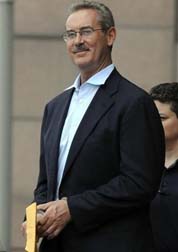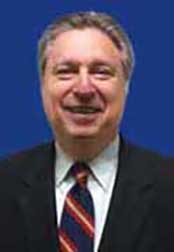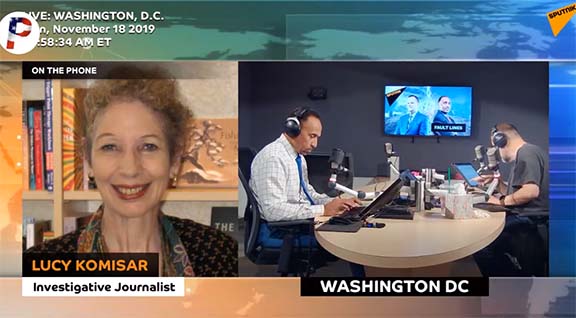By Lucy Komisar
Nov 6, 2019
What happens when a major U.S. law firm helps a client steal billions from his victims in the largest Ponzi scheme after Bernie Madoff? When it‘s a well-connected U.S. law firm, nobody goes to jail and it has to settle only for less than 1 percent of the scam. And of course, this will be all over the front pages, right? Well, no. You probably don‘t know about it.

A major U.S. law firm Greenberg Traurig just a few weeks ago agreed to pay $65 million to settle a complaint by victims of the fraud it helped Allen Stanford carry out to cheat thousands of investors of $7.2 billion. The largest Ponzi take after Madoff. The Court has set a hearing on the settlement for February 2020.
The settlement was approved February 25, 2020. It was not reported in the general press.
Stanford is in prison for 110 years. Here’s the indictment.
A few of his direct collaborators went to jail.
But the lawyers who organized it all? The bankruptcy receiver says Greenberg Traurig made $4 million representing Stanford. None of the Greenberg lawyer-collaborators was prosecuted. So, they pay only cash for facilitating a massive criminal Ponzi scheme. They get a pass on jail time.

Under the agreement Greenberg Traurig makes no admission of guilt. That is standard to get a deal. But take a look at what Greenberg did, and you decide the law firm’s guilt.
I wrote this for the Miami Herald in 2009 and for it won a Gerald Loeb award, the major prize in financial journalism. It was about how the Florida Banking Department together with Greenberg facilitated the scheme.
No other media reported the story. Because local officials collaborating with law firms to cheat investors is not a story, right? Unless the papers get the story themselves. At the time, media that ignored the story I broke found time and news inches to report about the unfortunate soccer team of Antigua, where Stanford set up his scam bank, that no longer had his financing.
Financial Times had Stanford story and caved to legal threat
In one case, the Financial Times, which sees itself as a truth-teller to investors, had a story by its own reporter Tony Hetherington in 1991 exposing Stanford’s shady dealings in Montserrat and Antigua and reporting that Stanford Financial was not authorized to operate banking offices in the U.S.
Another Hetherington article, “Monster Rat in Montserrat,” described how bank advertisements offered CD rates 2-3 points higher than rates obtainable at any other financial institution and that even though it was purportedly an Antiguan bank, prospective clients were directed by the advertisement to request more information from its offices in Houston.
He questioned how it could be selling bank products from the U.S. since it had no banking license there, and also thought that Latin American depositors might be tricked by such advertisements into believing that, in dealing with the bank, they were dealing with “Texans who have been checked out by the authorities and granted a banking license”.
Stanford sent the Financial Times a legal letter and the newspaper, to avoid litigation, repudiated the stories and published an apology. The FT didn’t seem to care that everything Hetherington wrote was true. Stanford knew that his threat against a major British paper couldn’t stand up.
But, helped by the FT’s lack of journalistic integrity, he went on for another 18 years victimizing thousands of investors till he was finally caught. Dear FT, would you like to do lunch about this? (Inside joke about the FT’s famous price-tag lunches with newsworthy figures. He had salmon, I had….it cost a lot.) Hetherington now works for the Daily Mail.
I waited to see if the MSM would take up the settlement story and all its juicy details, but no. Corruption by a major U.S. law firm is not a story. Especially if it relates to the second biggest American Ponzi scheme after Madoff. Yawn.
Click on the 2009 story they ignored then, and ignore now:
Exclusive: Florida bank agency helped fraudster Stanford evade regulations to sell phony CDs

Greenberg acting as Stanford‘s lawyer got the Florida Banking Department to allow him to move money offshore to Antigua with no regulation. It did this via an agreement to create a foreign trust that would be allowed to bypass regulators.
The state‘s decision allowed Stanford to expand his banking network by offering his prize investments ” certificates of deposit ” without reporting the purchases. Totally illegal. Against all anti-money laundering rules.
Here‘s the slick Greenberg memo promoting the scam. Here is the memo of agreement to set up this scam. And here is the memo where the Banking Department lawyer says it was illegal! I obtained them through a FOIA request.

Greenberg got Art Simon, head of the Banking Department, to sign off on the corrupt deal. Anything happen to him? Nooooo. He had been a state representative and a lobbyist and went on to teach at the University of Miami.
The victims have been in court for seven years.
Their complaint against Greenberg Traurig said:
Stanford utilized the veneer of an offshore bank in the Caribbean – that was in actuality run entirely from the United States – to steal billions of dollars from thousands of investors through the fraudulent sale of bogus bank CDs. In reality, the offshore bank was Stanford’s personal piggy bank, and the global Stanford Financial network of entities was simply a collection of feeder companies whose sole purpose was to sell the bogus CDs and thereby pump money into the pockets of Stanford.
Note that “offshore” banks are often run from the U.S. The computer is in the U.S. The “bank” is in “you name it.” The U.S. government knows this but doesn‘t seem to care. A government investigator once told me that the offshore branch of an international bank was run via a computer in New York. Do you really think that the bank branches registered in Grand Cayman are really run by people sitting (or sunning) in Grand Cayman?
Here are the details.
The complaint said: Stanford refused to comply with laws, including proper registration of his securities business in the U.S., because full compliance and registration would have led to more government scrutiny of his offshore bank and exposed the fraudulent nature of the CD program.
As a result, and with the help of Greenberg, Stanford insulated himself against regulatory scrutiny and was able to operate an unregistered investment company issuing unregistered securities from the United States while deceiving his customers into believing that his global operations were legitimate and properly regulated, and that the CD products offered by his offshore Ponzi bank were safer and more secure than CDs issued by U.S. banks.

Speaking for the victims, the lawyer said: Stanford could not have perpetrated this global mass fraud on his own. He needed corrupt regulators in his chosen offshore jurisdiction of Antigua, shady accountants, and skilled and complicit lawyers to help him. He found the perfect match in Carlos Loumiet, a Miami international banking lawyer who was Stanford’s kindred spirit and legal facilitator for over twenty years, and Suarez, Loumiet’s protégé who rose to become Stanford’s Chief of Staff and right hand.
Loumiet served as the Texas-based Stanford Financial Group of companies’ self-proclaimed outside general counsel for over twenty years, from 1988 until 2009. For 13 of those years, Loumiet was a partner at Greenberg leaving that firm and taking the Stanford relationship with him to join Hunton & Williams in 2001.” Now he works at Nelson Mullins, which doesn’t seen concerned that he is a Ponzi fraud enabler.
While at Greenberg Loumiet materially assisted Stanford’s global Ponzi enterprise in three essential ways:
- he helped Stanford take over the tiny, impoverished Caribbean island of Antigua and thereafter control the notoriously corrupt Antiguan government in order to establish a safe haven where Stanford could operate above the law;
- he assisted Stanford to establish all of his U.S. marketing and sales feeder offices, including the illegal offshore trust representative offices in Miami, Houston and San Antonio whose sole purpose was the sale of SIBL CDs to Latin American investors and ultimately funnel billions of dollars into Stanford’s Ponzi scheme; and
- he and his law firm helped Stanford structure the transactions through which Stanford invested the money he pilfered from SIBL, including massive investments in Caribbean real estate and speculative venture capital investments that eventually even included a very unsuccessful and expensive movie project.”
In its December 1995 issue spotlighting lawyers under 45 years of age, American
Lawyer magazine reported that Loumiet‘s international practice group at Greenberg was
responsible for 20% of the law firm‘s revenues that year.
Greenberg Traurig makes no admission of fault or wrongdoing. And U.S. law enforcement doesn‘t see it necessary to indict anyone there.
Allen Stanford is serving a prison sentence of 110 years imposed at federal court in Texas in 2012 after he was convicted of fraud, money laundering, and obstructing an investigation by the U. S. Securities and Exchange Commission.
Gilbert T. Lopez Jr., former chief accounting officer of Stanford Financial Group Company, and Mark J. Kuhrt, the former global controller of Stanford Financial Group Global Management, were each sentenced to 20 years in prison for their roles.
James M. Davis, the former chief financial officer of Stanford International Bank (SIB) and Houston-based Stanford Financial Group, was sentenced to five years in prison plus personal money judgment of $1 billion for his role in helping Stanford perpetrate his fraud scheme.
Laura Pendergest-Holt. former Chief Investment Officer of the Stanford Financial Group, was sentenced to three years in prison.
Leroy King, former head of Antigua’s Financial Services Authority, the country’s banking regulator, was extradited to the U.S. this month after he lost a decade-long, desperate legal action in Antigua.
Greenberg Traurig is doing just fine, thank you. After seven years of litigation, it settled with the bankruptcy trustee 60 days before the scheduled trial. Other law firms that helped Stanford previously settled: Hunton & Williams paid $34 million, Proskauer Rose $63 million, and Chadbourne & Parke $35 million.
And the U.S. media considers this a non-story.
Complaint by Bankruptcy Receiver 2012.
Second amended complaint 2018. The complaint, with key parts highlighted.
SEC motion to approve settlement Oct 2019. Motion with key parts highlighted.
From the second amended complaint, how Greenberg Traurig help Stanford steal $7.2 billion from investors and break the law in the U.S. and abroad. (Bold face is mine.) Are criminals allowed to have law licenses? Why haven’t the corrupt lawyers who collaborated with Stanford on his Ponzi scheme been prosecuted?
G. Dissecting the Stanford Fraud 15
H. Loumiet and Greenberg Assist Stanford‘s Illicit Securities Scheme 17
1. The Beginning: Representing the Rogue Offshore Banker 17
2. Stanford Flees Montserrat 21
3. Greenberg Assists Stanford to Buy His Way into Antigua 23
4. Greenberg Helps Stanford to Target and Silence U.S. Regulatory Officials 28
5. Greenberg Assists Stanford to Silence Journalists 29
6. Greenberg Acts as Securities Counsel for Stanford 30
7. Greenberg Knows Stanford is Violating U.S. Securities Laws 31
8. Loumiet Joins Stanford Financial‘s Advisory Board 33
9. Greenberg Assists Stanford‘s Attempts to Establish Bank Sales Offices in the U.S 34
10. Greenberg Continues to Assist Stanford with Repeated U.S. Government Investigations 36
11. Loumiet Convinces Stanford to Change the Names of his Companies 37
12. Greenberg Assists Stanford to Consolidate his Influence over Antigua 38
13. Greenberg‘s Knowledge of Stanford‘s Corruption of Antiguan Officials 41
14. Greenberg Helps Stanford Become Antigua‘s “Shadow Government” 43
15. Greenberg Protects Stanford by Suing Journalists 44
16. Greenberg Protects Stanford by Threatening U.S. Government Officials 47
17. Greenberg Conducts a Counter-Intelligence Campaign against the U.S. Government 48
18. Greenberg Assists Stanford to set up Stanford Group Company 49
19. Stanford Expands His Massive Real Estate Investments in Antigua 50
20. Greenberg Help Stanford Take Over Antigua‘s Banking Regulatory System 51
21. Greenberg Advises Stanford on Implications of His Bribe of Antiguan Officials 59
22. Greenberg Helps Stanford Establish Representative Offices in the U.S. for Stanford‘s Antiguan Trust Company 60
23. Greenberg Assists Stanford to Establish Stanford Trust Louisiana 67
24. Greenberg Assists Stanford With His Personal IRS Dispute 68
25. Greenberg Represents Stanford in SEC Inquiry 69
26. Greenberg Helps Stanford Crush Employee Whistleblower 72
27. Greenberg Learns Stanford‘s Loans to Antigua Violate Antiguan Law 74
28. Greenberg Assists Stanford with its Reg D Sales of SIBL CDs to U.S. Citizens 75
29. Greenberg Advises Stanford Not to Register as an Investment Company 76
30. Greenberg Helps Stanford With Another DEA Investigation 77
31. Greenberg Learns That Stanford is Violating Antiguan Election Laws 78
32. Greenberg Discovers Signs that SIBL is a Ponzi Scheme 79
33. Greenberg Assists Stanford‘s Attempt to Buy a U.S. Bank: More Red Flags 82
34. Loumiet Moves to Hunton & Williams; Greenberg Continues to Represent Stanford 83
35. Loumiet‘s Personal Relationship with Allen Stanford 88
36. Suarez Handles Stanford Money Laundering Crisis in Mexico 90
37. Suarez Handles Crisis in Ecuador 92
38. The Beginning of the End: Suarez Resigns 92
39. The End of Stanford Financial 93
Hear audio interview on Fault Lines. This story starts at 15:20.

Copies of the Greenberg Settlement Agreement and other supporting papers may be obtained from the Court’s docket, and the websites of the Receiver (http://www.stanfordfinancialreceivership.com) and the Examiner (www.lpf-law.com/examiner- stanford-financial-group/). Copies of these documents may also be requested by email, by sending the request to Nadia N. Ramon at le************@*****aw.com; or by telephone, by calling (210) 630-4200.
Turns out that www.superlawyers.com/ lists Carlos Loumiet as a super lawyer. I wrote the editor Erik Lundegaard, Are you aware that according to documents filed by the Allen Stanford bankruptcy receiver, he helped Stanford organize a $7.2 billion Ponzi scheme? That the law firm he worked for has agreed to pay $65 million to victims. This super lawyer seems to have been a super fraud enabler.
Super Lawyers is not some fly-by-night organization but is part of the corporate media company Thomson Reuters. When Lundegaard didn’t answer my query, I asked Thomson Reuters to comment on why Loumiet is listed as a super lawyer. If a lawyer is good at enabling corruption, does that make him or her super? No reply. Is it corrupt to promote a corrupt lawyer?
Revealed in 2023: “Politico” wrote that the Greenberg Traurig CEO bought property from Supreme Court Justice Neil Gorsuch, who did not reveal the purchaser of the deal, which Politico said netted him a $250K to $500K profit. Since then GT had 22 cases before or presented to the court. “In the 12 cases where Gorsuch’s opinion is recorded, he sided with Greenberg Traurig clients eight times and against them four times.” So seemed a good buy.


Carlos Loumiet is listed by Martindale Hubble as a “super lawyer.”
https://profiles.superlawyers.com/florida/miami/lawyer/carlos-e-loumiet/ac80d7ed-1cee-46f7-af7a-2ed76b083a11.html
LK: Maybe they mean he is super at helping crooks carry out their scams. A good question to ask them!
Pingback: Der Spiegel exposé of Wm Browder, mini-payout by lawyers who aided Ponzi schemer Allen Stanford – The Komisar Scoop
I lost an incredible amount to this company, after lots of persuasion I decided to invest, after months of constant investments i decided to ask for a payout and this was the beginning of my turmoil, at my dismay I was still asked to invest more which really affected me and despite all my effort to contact them failed. I was introduced to investigators247.com who helped and took legal actions against them and i was able to retrieve every penny I invested.
You can contact them if you find yourself in a similar situation and tell them i referred you.